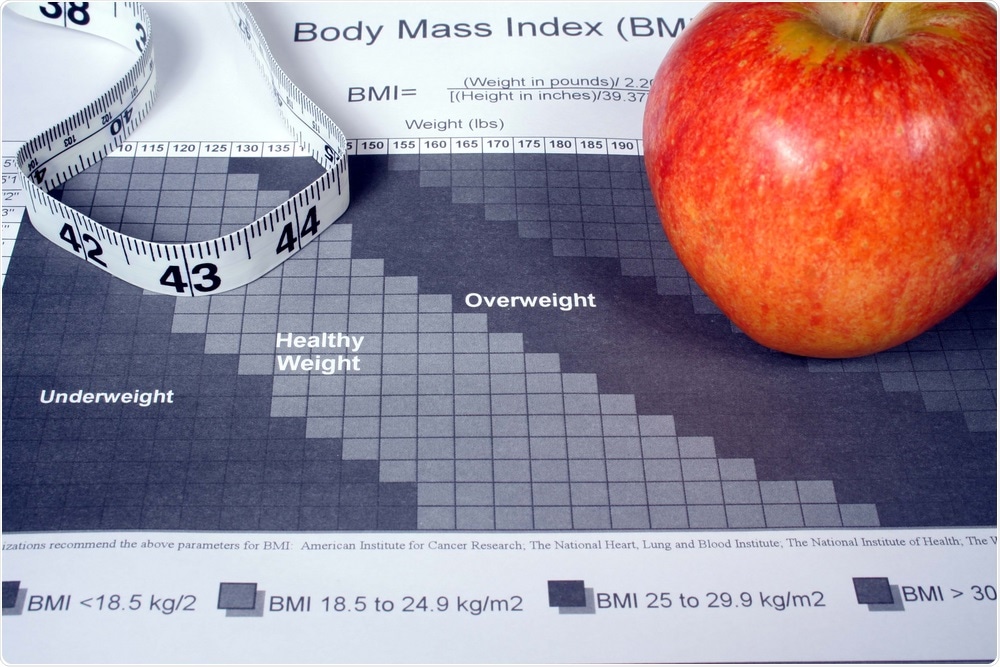The COVID-19 pandemic has affected over 60 million people worldwide, with nearly 1.43 million succumbing to severe COVID-19 disease, and nearly 40 million recovered. COVID-19 disease caused by severe acute respiratory syndrome coronavirus 2 (SARS-CoV-2) is severe, leading to life-threatening complications in a small proportion of individuals. Several risk factors have been associated with severe COVID-19, among which obesity is one.
French researchers led by first author Abdallah Al-Salameh from the Department of Endocrinology, Diabetes Mellitus and Nutrition, Amiens University Hospital, Amiens, France, have published findings of their study titled, “The association between body mass index class and coronavirus disease 2019 outcomes,” in the latest issue of the International Journal of Obesity.
Background and study objectives
Obesity, high body mass index, and diabetes have been known to be risk factors for severe course of COVID-19. The researchers find from available evidence in scientific literature that nearly 40 percent of the hospitalized patients are obese with a high BMI. Morbid obesity, for example, is typically associated with a severe clinical course of the disease they write.
Obesity and COVID-19 pathology
The researchers explain that those with obesity often have compromised respiratory functions, and this predisposes them to succumb not only SARS-CoV-2 infection but also other respiratory infections.
Further, abdominal obesity is associated with a low-grade inflammation, and this can alter the immune responses to infections, including COVID-19 disease. Those with obesity are almost always diabetic and may have heart disease and other metabolic problems, the researchers explain. These comorbidities make them vulnerable to infection with the SARS CoV-2, they add.
The main aim of this study was to quantify the association between body mass index (a measure of obesity) and critical forms of COVID-19. The researchers say that this is important to understand to the relationship between obesity and COVID-19 in order to provide care to vulnerable individuals and prevent poor outcomes.
Study design
For this study, the researchers included consecutive adult patients with laboratory-confirmed COVID-19 who needed to be hospitalized. They were all admitted to the Amiens University Hospital (Amiens, France). Data on the patients were gathered retrospectively from the hospital database.
Confirmed COVID-19 were those cases that were confirmed on reverse-transcriptase polymerase-chain-reaction (RT-PCR) assay of nasopharyngeal swab specimens. Only those patients or their legal guardians consenting to be part of the study were included in the analysis. For the purpose of this study, normal-weight patients were those with a BMI of less than 25 kg/m2.
The important parameters recorded were:
- Demographic data including age, gender, BMI, social factors
- Risk factors
- Medical history
- History of intake of medications of special concern
- Detailed clinical data
- Routine laboratory results
- Outcomes of the patients
The primary endpoints of assessment were:
- Admission into the intensive care unit (ICU) and
- Death
The secondary endpoints of the study were:
- Need for mechanical ventilation
- Diagnosis of acute respiratory distress syndrome (ARDS, according to the Berlin criteria) specified on the ICU discharge note
- Diagnosis of acute coronary syndrome (serum levels of high-sensitivity cardiac troponin Ic above the 99th percentile for the normal population, seen on ECG/ echocardiogram)
- Acute renal failure (according to the Kidney Disease Improving Global Outcomes guidelines)
- Secondary infection
- The overall duration of stay in the hospital
Associations between BMI categories and the endpoints were made using logistic regression analysis.
Findings
Overall a total of 433 patients hospitalized with COVID-19 were included in the study. An overview of the results is as follows:
- Among 329 patients whose BMI was gathered, there were:
- 20 (6.1 percent) were underweight
- 95 (28.9 percent) had a normal weight
- 90 (27.4 percent) were overweight
- 124 (37.7 percent) were obese
- The median age for different BMI categories were:
- Underweight – 84.5 years
- Normal weight – 81 years
- Overweight – 71 years
- Obese – 66 years
- ICU admission was among 35.1 percent and 52.6 percent among overweight and obese patients, respectively
- Deaths were seen in 23 percent and 36.1 percent among overweight and obese patients, respectively
- The odds ratio of severe disease associated with the primary endpoint of death or ICU admission according to different BMI categories were as follows:
- Overweight – Odds ratio 1.58 [0.77–3.24]
- Obese - Odds ratio 2.58 [1.28–5.31]
- The odds ratio of severe disease associated with ICU admissions according to different BMI categories were as follows:
- Overweight – Odds ratio 3.16 [1.29–8.06]
- Obese - Odds ratio 3.05 [1.25–7.82]
- Unadjusted ORs for deaths was same for all BMI categories
Conclusions and implications
The team writes, “...obesity was significantly associated with a greater likelihood of occurrence of the primary endpoint (death or ICU admission)”. The researchers wrote that being overweight is more clearly associated with ICU admissions. The team concluded, “We found that the frequency of the primary endpoint among patients with COVID-19 was twice as high for obese individuals than for individuals with BMI < 25 kg/m2.” They called for future larger studies in other populations to understand the association between BMI and unfavorable outcomes among patients with COVID-19.
"severe" - Google News
November 27, 2020 at 09:14AM
https://ift.tt/3lhS9M4
Body mass index and severe COVID-19 - News-Medical.Net
"severe" - Google News
https://ift.tt/2OrY17E
Shoes Man Tutorial
Pos News Update
Meme Update
Korean Entertainment News
Japan News Update
Bagikan Berita Ini
















0 Response to "Body mass index and severe COVID-19 - News-Medical.Net"
Post a Comment